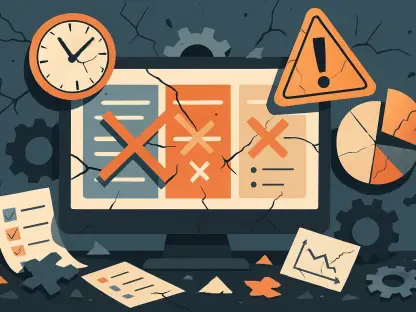In a digital landscape increasingly plagued by sophisticated cyber threats, it comes as a disheartening revelation that the most rudimentary and predictable passwords continue to dominate the lists of hacked credentials, with ‘123456’ holding its notorious position as the most commonly breached password this year. Recent data from industry reports and cybersecurity studies show that it surfaces in millions of compromised datasets across the globe. This alarming trend points to a persistent and dangerous disconnect in how seriously individuals and organizations take cybersecurity. Despite years of public awareness campaigns and the availability of advanced security tools, millions remain vulnerable due to lax password practices. The consequences of such negligence are not merely personal but extend to critical infrastructure, exposing systemic weaknesses that cybercriminals are all too eager to exploit. This ongoing issue demands a closer look at why these habits persist and what can be done to address them effectively.
Persistent Vulnerabilities in Password Choices
The enduring popularity of weak passwords like ‘123456,’ ‘password,’ and ‘admin’ paints a grim picture of cybersecurity in the current digital age. Comprehensive studies from various cybersecurity firms reveal that these simplistic combinations are still used by millions of users worldwide, despite repeated warnings from experts. This isn’t just a minor oversight; it’s a glaring vulnerability that hackers can exploit with minimal effort. Modern brute-force tools can crack such passwords in less than a second, turning what should be a basic line of defense into an open door for unauthorized access. The data underscores a troubling reality: even with heightened awareness of cyber risks, a significant portion of the population continues to prioritize convenience over security, leaving personal and professional accounts at risk of compromise on a massive scale.
Further delving into this issue, the reasons behind the stubborn reliance on weak passwords become clearer, yet no less frustrating. Many users opt for easily memorable strings because they manage multiple accounts and fear forgetting complex credentials. Unfortunately, this choice often stems from a lack of understanding of how quickly these passwords can be guessed or cracked using automated tools. Additionally, some individuals and even businesses fail to update default passwords on devices or systems, providing hackers with effortless entry points. Reports highlight that this behavior isn’t confined to a small group but is a widespread problem affecting diverse demographics and industries. Until this fundamental mindset shifts, the reign of predictable passwords will likely continue, perpetuating a cycle of breaches and security failures that could be prevented with minimal effort.
User Behaviors Amplifying Security Risks
A deeper examination of user habits reveals a troubling pattern that exacerbates the password security crisis beyond just poor choices. Password reuse stands out as a critical issue, with a significant percentage of individuals applying the same credentials across multiple platforms and services. This dangerous practice means that a single breach can cascade into widespread access to a user’s entire digital presence, from personal email to financial accounts. The simplicity of many passwords—often limited to just 8 or 10 characters—further compounds the problem, as shorter strings are exponentially easier to crack with today’s computing power. These behaviors collectively create a fertile ground for cybercriminals who rely on predictability and repetition to gain unauthorized access.
Beyond reuse and brevity, there’s an evident gap between awareness and action that fuels this ongoing vulnerability. Many users are informed about the risks of weak passwords through media campaigns and educational efforts, yet fail to implement recommended practices. Whether due to perceived inconvenience or a belief that they won’t be targeted, the reluctance to adopt stronger habits remains a significant barrier. Cybersecurity reports emphasize that even in corporate environments, where stricter policies might be expected, employees often bypass guidelines for ease of use. This disconnect highlights the need for more than just information; enforceable measures and accessible tools must bridge the divide between knowing better and doing better, ensuring that knowledge translates into meaningful change in user behavior.
Tangible Dangers of Inadequate Passwords
The ramifications of weak password practices extend far beyond theoretical risks, manifesting in real-world incidents that expose the depth of the problem. A striking example from this year involves a U.S. water plant where hackers gained access using a default password as basic as ‘1111.’ This breach not only compromised the facility but also raised alarms about the vulnerability of critical infrastructure to cyber threats. Such events are stark reminders that poor password security can have consequences affecting public safety and national security, far surpassing individual losses. The ease with which attackers exploited this weakness underscores how these lapses serve as gateways for broader, more devastating cyberattacks that can disrupt essential services.
Moreover, the impact of inadequate passwords is felt on a personal level through countless account takeovers and data breaches reported annually. Cybercriminals often target individuals with weak credentials to steal sensitive information, commit identity theft, or extort money. These incidents, while less publicized than infrastructure attacks, collectively erode trust in digital systems and impose significant financial and emotional burdens on victims. Industry analyses point out that many of these breaches could be prevented with basic precautions, yet the persistence of lax habits suggests a systemic failure to prioritize security. As hackers continue to exploit these weaknesses, the cumulative damage underscores the urgent need for a cultural shift in how password management is approached at every level of society.
Evolving Threats and Hesitant Adoption of Solutions
As cyber threats grow more sophisticated, the urgency to overhaul password security practices becomes increasingly apparent. Emerging technologies like quantum computing pose a looming challenge, with the potential to render current encryption methods obsolete in the coming years. While today’s brute-force attacks already crack simple passwords in seconds, future advancements could further diminish the time needed to bypass even moderately complex credentials. Despite this escalating danger, user behavior remains largely unchanged, with many still clinging to outdated and insecure practices. This stagnation contrasts sharply with the rapid evolution of hacking tools, creating a widening gap between threat levels and defensive capabilities.
On the flip side, promising solutions like passkeys, biometrics, and password managers exist to counter these risks, yet their adoption lags frustratingly behind. These technologies offer more robust alternatives to traditional passwords, reducing reliance on human memory and error. However, resistance to change—whether due to unfamiliarity, cost, or distrust—prevents widespread implementation among individuals and organizations alike. Reports indicate that even when such tools are available, many fail to enforce or encourage their use, leaving vast numbers of accounts exposed. Addressing this hesitation requires not only technological innovation but also strategic efforts to build trust and accessibility, ensuring that safer options become the norm rather than the exception in safeguarding digital identities.
Path Forward for Stronger Digital Defenses
Reflecting on the persistent issue of weak passwords, it’s evident that past efforts to educate and warn users have fallen short of creating lasting change. Incidents like the breach of critical infrastructure using laughably simple credentials exposed the depth of vulnerability that lingered unchecked for too long. The data from this year paints a clear picture: millions of accounts were compromised because of predictable choices like ‘123456,’ and countless others suffered due to reused or short passwords. These failures highlighted a collective oversight in prioritizing convenience over security, a mistake that enabled cybercriminals to exploit weaknesses with devastating effect.
Looking ahead, the focus must shift toward actionable strategies that enforce change rather than merely suggest it. Implementing mandatory password complexity requirements across platforms and promoting the widespread use of password managers can serve as immediate steps to bolster defenses. Additionally, accelerating the adoption of alternative authentication methods like biometrics and passkeys offers a long-term solution to reduce reliance on flawed human habits. Collaboration between technology providers, policymakers, and educators is essential to create an environment where strong security is the default, not the exception. Only through such concerted efforts can the tide be turned against the enduring threat of hacked passwords, securing digital spaces for the future.









